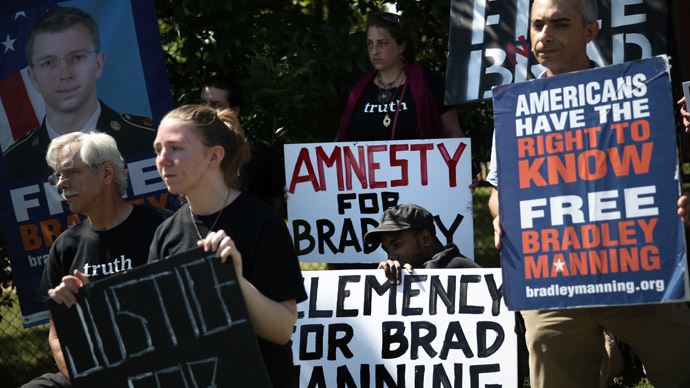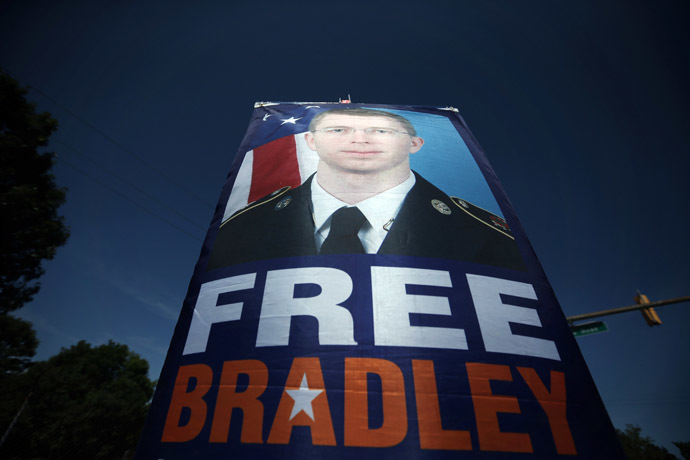Manning verdict: US saying ‘send back whistleblowers, we're not charging them with capital offenses'

Washington will use Manning’s verdict to persuade the world community to extradite other whistleblowers back to the US, since the leaker was acquitted of the capital offense of aiding the enemy, former UK MI5 agent Annie Machon told RT.
RT:What are your thoughts on the Manning’s
verdict?
Annie Machon: It has been summed up by the Pentagon which
said that no lives have been put at risk by his
disclosures. By exposing criminality or the war crimes of
the military or intelligence agencies, he is doing a service to
the public, or countries and to our democracies. And by
doing that, for him to have to face, now, probably 20 years in
prison is still a disgrace. Whistleblowers should be protected.
They should not be persecuted. They are doing the service to the
democracies they live in. They are exposing crime and trying to
improve the service of the military and intelligence agencies in
their work to protect us.
I was hoping for it. I thought that they might be more heavy
handed because the prosecution certainly really pushed. Their
closing statement during his trial was incredibly illusive,
innuendo laden, trying to make him out the biggest traitor in
history. The very robust defense closing statement helped.
But for most people, it is a sense of natural justice. This is a
young man, self-consciously saying he loves his country, he wants
it to improve, he wants to protect the very way of life. That is
what he said in very private emails. So, yes sure, it is a good
recognition. But it might be a subtle signal to other countries
saying look, we are not a totalitarian state, we’re not going to
prosecute whistleblowers at the end degree, send us back the
other people that we want like Snowden and Assange.
They are doing it to be vindictive. The US government is doing it
to deter future whistleblowers, which obviously has not happened
because now we have it with Snowden and it is a complete
overreaction to persecute future whistleblowers who are putting
the information out there that is very much in the public
interest which informs the public what their government and the
military are doing and then to say that they are traitors to
their country- they are not, they are performing public
service. And for them to persecute this young man and for
him to potentially spend his entire life in prison for informing
us is a sign of a sick democracy. What are we now the enemy?
Because he informed the general public around the world what has
been going wrong with the American democracy.
RT:What kind of precedent does this trial set?
AC: It is a dangerous precedent, not for just future
whistleblowers, as we’re seeing again with the Edward Snowden
case, because he could potentially face such charges, but it is
also very dangerous for the free press, because this can be used
in future persecution of WikiLeaks, which we know that the US
government want to carry out at some point. There is already
sealed secret indictment in Virginia.

So what we are looking at is, if a whistleblower goes to the press, then they are putting the information out there to the public, they are informing the public, than that information is out there in the internet, which anyone can read. And then you get the situation that people that publish it are conspiring of aiding the enemy. And that is what the WikiLeaks is facing. And if they are going to go at the WikiLeaks, they should also go for the New York Times and all the other partner major news organizations that also published this.
RT:Will it deter other potential whistleblowers from leaking information in the future?
AC: No, you just had the case of Edward Snowden, who said the more draconian pushback, the better the whistleblower will become. I think, one, this is very good, because it shows that the judiciary is independent in the US and will uphold what remains of their constitution. But my more cynical side would say that this might be a political dis-vision to send a signal to the world that in fact the US is not a draconian system that will not classify a whistleblower as aiding the enemy, so please allow people like Julian Assange or Edward Snowden to be extradited to our country to feel full weight of the law.
RT:Is that fair that he will spend any time in prison?
AC: No, he has done a duty to his country by exposing criminality on the part of the military, on the part of the intelligence agencies. To prosecute rather than protect whistleblowers, young whistleblowers as well, he was so young when he did it, and not to investigate the crime is criminal in itself. These people need protection. They need their disclosure to properly and thoroughly investigated, if democracy has any chance of surviving in the US
RT:What will your advice be to those who discover that their county is breaking the law?
AC: They need to look at history and the mistakes previous whistleblowers made and learn from that. And I think that is what Edward Snowden attempted to do and the next one would be even cleverer about how they protect themselves. Getting involved with organizations such as WikiLeaks or their successors who will protect you is very key. You have to be teched-up, you have to be crypto, you have to be clever.
The statements, views and opinions expressed in this column are solely those of the author and do not necessarily represent those of RT.













